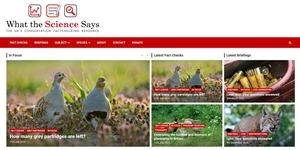 What the Science Says is a new website that sets out to challenge misinformation and misreporting of ecological science. The online resource is the Game & Wildlife Conservation Trust’s (GWCT) response to what many in the scientific community see as increasing inaccuracy in the discussion of science by the media and policy makers.
What the Science Says is a new website that sets out to challenge misinformation and misreporting of ecological science. The online resource is the Game & Wildlife Conservation Trust’s (GWCT) response to what many in the scientific community see as increasing inaccuracy in the discussion of science by the media and policy makers.
“Our aim is to fight misinformation by exploring and clearly presenting the scientific facts behind claims made in the press and on social media,” says Teresa Dent, Chief Executive of the GWCT. “We will examine relevant claims from the media, reports or manifestos; look at the evidence; and support, explain or correct them. This will be a reliable, unbiased resource that will assess the science behind these claims to understand how well supported they are.”
The Game & Wildlife Conservation Trust has a well-deserved reputation for challenging misinformation when it appears in the media. In 2019 the charity had 37 letters published in the national and regional press, many correcting inaccuracies or unbalanced reporting.
“Our role,” continues Ms Dent, “is not just to research problems and provide solutions, but to ensure the accurate representation of science in the public interest. The What the Science Says website will provide a place where claims made by journalists and policymakers can be held up to scrutiny. We want to correct bad information in the media, highlighting where claims have no basis in scientific evidence, because bad information can easily creep into policy and lead to bad decisions.”
The information presented will be unbiased. What the Science Says is committed to the principles of the International Fact-Checking Network (IFCN) and run in accordance with them. More details can be found on the IFCN website.
Commenting on the need for a fact-checking resource like this, Teresa Dent said: “The way people access the media has changed dramatically in recent years. Half of British people now get their news from social media and Facebook is the third biggest news source in Britain, bigger than any newspaper. ‘Fake news’ is a massive problem, so accuracy is even more important as bad information travels fast online.”
Traditional media is not, says the GWCT, exempt from misinformation either. The BBC continues to lead audience figures for news and current affairs. Yet there are recent examples of inaccuracy or misrepresentation in its scientific reporting. In March BBC Radio 4’s ‘Short Cuts’ programme told its audience that there were just 100 grey partridges left in the UK. The real figure is closer to 70,000, as verified by the Avian Population Estimates Panel, the British body responsible for these figures.
When challenged by the GWCT, the BBC blamed human error: the producers had misread the data supplied by the Zoological Society of London. While the BBC was quick to remove the inaccuracy from the recorded version of the programme available to those listening on ‘catch up’, for those who listened live this ‘fact’ was already out there. Arising from a misunderstanding of the data, this error highlights not a lack of impartiality, but a lack of specialist knowledge. In future, What the Science Says will provide journalists with an easy way to fact-check conservation and environmental stories.
What the Science Says includes Fact Checks, which look at specific claims in the media. Topics covered so far include hen harriers on grouse moors, the numbers of mountain hares, and whether or not there are only 100 harvests left in British soil. The site also offers comprehensive Briefings, answering questions on topics ranging from curlew, lynx and woodcock to the issues around lead shot. The site is searchable by subject or species and offers users the opportunity to suggest topics for the research team to examine.
Visit www.whatthesciencesays.org to view the website.
Notes to editors
The Game & Wildlife Conservation Trust – providing research-led conservation for a thriving countryside. The GWCT is an independent wildlife conservation charity which has carried out scientific research into Britain’s game and wildlife since the 1930s. We advise farmers and landowners on improving wildlife habitats. We employ more than 60 post-doctoral scientists and other research staff with expertise in areas such as birds, insects, mammals, farming, fish and statistics. We undertake our own research as well as projects funded by contract and grant-aid from government and private bodies.
For information, contact:
Eleanor Williams
Telephone: 07592 025476
Email: press@gwct.org.uk